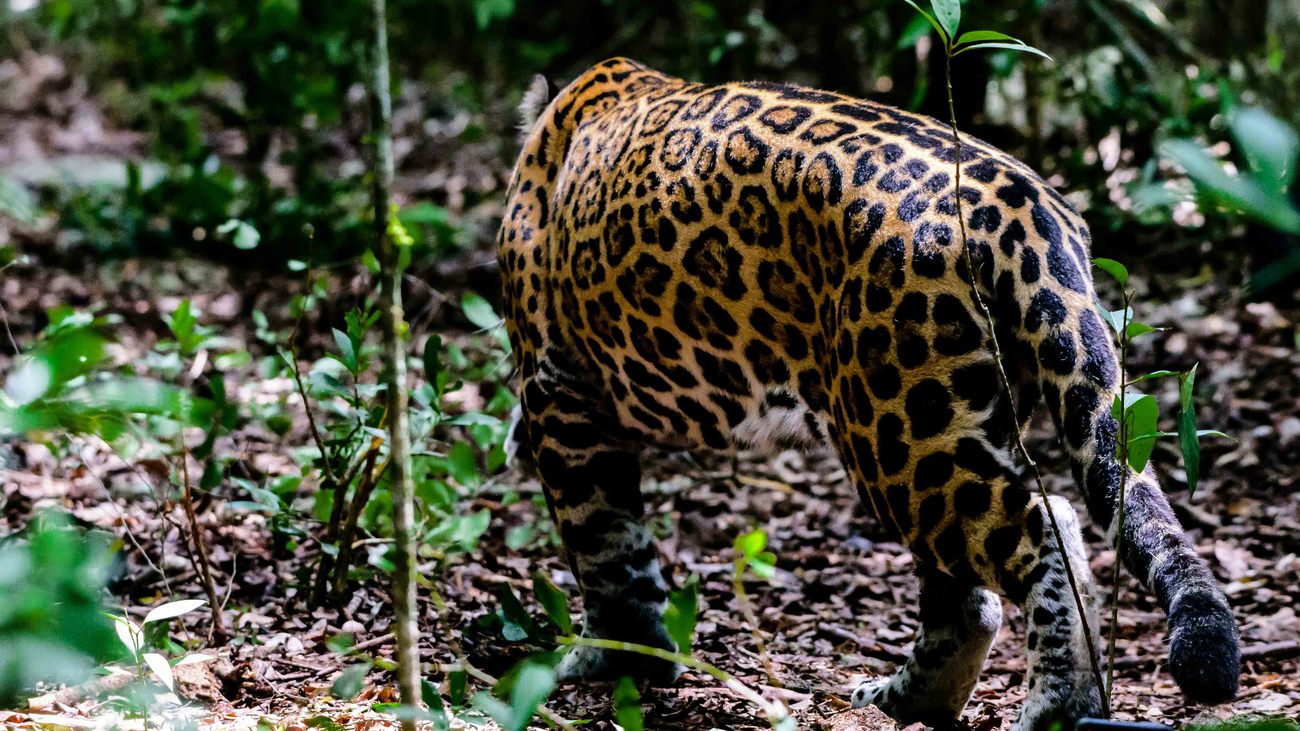Operation Jaguar - South America
To protect jaguars in the Americas, we are helping to fight the growing threat of illegal wildlife traderescued jaguar released back into the wild
rescued jaguar released back into the wild

Brussels - 27 November 2020 - Against all odds a juvenile jaguar is back in the wild after being seriously injured by a car and spending 100 days in rehabilitation.
For International Jaguar Day (November 29) the successful rescue and release can be celebrated for this threatened species which has suffered a heavy 25 per cent population decline in the past 20 years.
“You may think this is just one animal, but individual animals matter for conservation, especially when species are under pressure for survival. The fact the jaguar is living where it belongs and not in captivity is a success for the conservation of the species,” Joaquin de la Torre, the International Fund for Animal Welfare’s (IFAW) Regional Director of Latin America said.
After the accident on June 11, the 18-month-old male jaguar was transferred to Payo Obispo Zoo in Chetumal, Mexico with a fractured shoulder blade and other injuries.
The fact the jaguar survived the strike and the journey to the zoo is rare. If car strikes don’t cause immediate death, the animal usually dies soon after or requires captive care for life.
“Swift action from the zoo, authorities, veterinarians, local community and IFAW was crucial to the jaguar’s survival,” Mr de la Torre said.
The jaguar’s recovery was monitored with minimal human interaction via cameras and spacious enclosures given he didn’t need surgery. The zoo’s closure due to the COVID-19 pandemic contributed to the successful recovery of Covi – his well-matching name.
On the day of release, Covi slowly emerged from his container and calmly walked towards the Sian Ka’an Reserve jungle. Within seconds he disappeared back into the wild.
Reflecting on Covi’s release – which is the first successful case of a rescue, rehabilitation and release of an injured jaguar in the region – Dr Erika Flores, IFAW’s Animal Rescue Coordinator for Latin America, said: “There are no words to describe the joy on everyone’s faces - which were covered by masks. We all shared this win.”
Covi was fitted with a satellite collar provided by the Mexican Alliance for Jaguar Conservation to track his movements before it self-releases in about 18 months.
Jaguars are a protected species under the Convention on Migratory Species (CMS), and under the Convention on International Trade in Endangered Species of Wild Fauna and Flora (CITES), but remain under pressure from habitat loss and poaching for their skin, teeth and other body parts.
To help protect this increasingly vulnerable species, IFAW works to mitigate jaguar conflicts with community animals and is part of Operation Jaguar – a joint project which trains law enforcement agencies to detect and prosecute wildlife crime to prevent poaching of the most iconic species of the Americas.
IFAW urges people to protect wildlife by avoiding the purchase of illegal wildlife products or taking wildlife selfies, respecting speed limits and watching out for animals on roads.
ENDS
Press contacts:
Benjamin Wiacek, Communications Manager
+32 492 17 15 81 or bwiacek@ifaw.org
Notes:
· Collection of images can be found here, copyright IFAW.
· Raw video footage can be found here and here, copyright IFAW.
· Covi’s success was made possible by collaboration between Payo Obispo Zoo, National Alliance for Jaguar Conservation, Federal Attorney for Environmental Protection, State of Quintana Roo Attorney for Environmental Protection, Biodiversity and Natural Protected Areas of the State of Quintana Roo (IBANQROO), National Commission for Natural Protected Areas and IFAW. Extra quotes by agencies involved below:
· Salvador Julio Cardoso, Head of the Wildlife Division at IBANQROO, said: “To see the jaguar walk towards the jungle again with a new lease of life is something I will never forget”.
· “Animals don’t know about holidays or pandemics, so we didn’t hesitate to come to his rescue,” said biologist Roger Braga González, who led the rehabilitation process.
About the International Fund for Animal Welfare (IFAW) - The International Fund for Animal Welfare is a global non-profit helping animal and people thrive together. We are experts and everyday people, working across seas, oceans and in more than 40 countries around the world. We rescue, rehabilitate and release animals, and we restore and protect their natural habitats. The problems we’re up against are urgent and complicated. To solve them, we match fresh thinking with bold action. We partner with local communities, governments, non-governmental organisations and businesses. Together, we pioneer new and innovative ways to help all species flourish. See how at ifaw.org
Related content
Our work can’t get done without you. Please give what you can to help animals thrive.